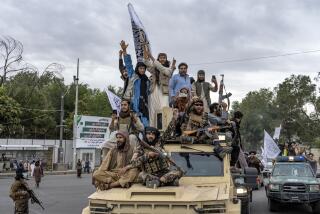Afghan president begins disbanding private security firms
- Share via
Reporting from Kabul, Afghanistan — Moving to enforce a pledge that has rattled Afghanistan’s foreign community, President Hamid Karzai has begun dissolving the Afghan operations of private security companies, including the firm formerly known as Blackwater, the government announced Sunday.
Karzai caught Western officials by surprise in mid-August when he announced a ban on private security firms that would take effect by year’s end. The U.S. Embassy at the time expressed support in principle but suggested the timetable was unrealistic.
NATO’s International Security Assistance Force relies on private contractors to guard bases and supply lines, and many international organizations also use private security firms. With the insurgency increasing its reach across the country, few consider the Afghan police and military ready to step in.
The moves aimed at security contractors were the latest show of tension between Karzai and his foreign backers. Western officials have been highly critical of corruption in the Afghan government, and there are indications of widespread fraud in last month’s parliamentary elections. Results still have not been released.
The Afghan leader often sounds aggrieved when referring publicly to his dealings with foreigners. In a speech Saturday, he told members of the Afghan security forces that they needed to prepare for the day when they would be responsible for safeguarding the country, because “it is possible that one day the international community … will leave us, like they left us in the past.”
Critics say the move to ban the contractors may be a way to tap into the millions of dollars in revenue generated by dozens of private security firms. Karzai, whose aides denied any financial motivation, had referred to the companies as a “mafia” and expressed determination to oust them.
Afghanistan also has a longstanding aversion to private armed groups. Militias led by warlords battled one another during the devastating civil war of the early 1990s, killing hundreds of thousands of civilians.
As with many presidential declarations, the details were not immediately clear. Karzai’s spokesman, Waheed Omar, said some of the eight companies initially targeted had already handed over weapons and disbanded, while the shutdown of others was in progress.
Speaking at a news conference in the capital, Kabul, Omar called the dissolution of the security firms “very good news for the people of Afghanistan.” Later, a statement from the presidential palace declared that “the process of disbanding of the private security companies [was] very successful so far.”
The eight consist of four Afghan and four foreign firms. Among the foreign companies is North Carolina-based Xe Services, formerly Blackwater, which has had a history of run-ins with Afghan authorities. Last week, a federal judge in Virginia declared a mistrial in the case against two security contractors for a subsidiary of Xe, who were accused of killing two Afghan civilians.
Also named by Afghan authorities as slated for closure were Four Horsemen International, based in New Mexico; NCL Holdings LLC, headquartered in Virginia; and Compass International, a British firm. Among the four Afghan companies is one of the largest security contractors operating in the country, White Eagle Security Services.
Prospective enforcement of the order remains murky. Under Karzai’s original decree, embassies and international organizations would be able to use private security on the grounds of their compounds but not off the premises.
Nearly 40 private security firms with about 26,000 workers are employed in Afghanistan by the U.S. government alone, including those working for the military and the State Department.
laura.king@latimes.com
More to Read
Sign up for Essential California
The most important California stories and recommendations in your inbox every morning.
You may occasionally receive promotional content from the Los Angeles Times.













